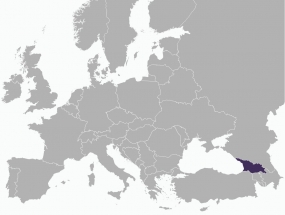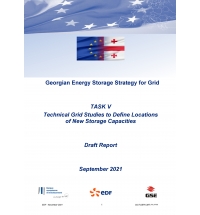Georgia Energy Storage Strategy for Grid
Client: EDF CIST (France), European Investment Bank
Type: Study
Finishing date: December 2021
Team: EDF Cist and EKC as subcontractor; EKC: Milan Ivanovic - Task V Leader
Key objectives of this Project are:
- Mapping of the commercially available energy storage technologies
- List of generic pros and contras of an energy storage development quantified from the technical, environmental, economic, fiscal and financial standpoints, on the electricity market
- Conclusion on the opportunity to develop energy storage in Georgia
- Optimisation of the integration of energy storage capacities
- Evaluation of the technical, economic, fiscal, environmental and social impacts of new electricity storage capacities in the electricity sector as well as its consequences on other economic sectors such as agricultural, transport, gas inter alia.
- Guidance and tools for the authorities for the sustainable and transparent implementation of an energy storage strategy, e.g. regulatory framework, pricing of grid services.
- Energy storage roadmap based on several scenario to be agreed with the Georgian stakeholders with timeline horizons of 2030 and 2040
- Priority list of energy storage projects based on a Least Cost Generation Expansion Plan
- Identification of any major technical obstacles in implementing the projects and windfall benefits that could arise from the related projects.
The main objective of the Task V is to localize new energy storage capacities in the Georgian power network, identifying at concept level the control types and possible integration with distribution or transmission grid and Energy Management System (EMS). The results of extensive and comprehensive system performance analyses are used as a base for identifying needs for energy storage. In addition, one of results of the Task VI of this Project (Economic modelling of the Georgian electricity system) is that "the PLEXOS model allows BESS and PHS to get benefits from peak-shaving and FCR (PHS only)". In addition to localization of the energy storage identified within this Task, it is also required to select location for 72 MW of BESS (1 MW/4 MWh BESS candidates) which is proposed in Task IV.
Type of services provided:
- Update / adjustments of Power Factory models of Georgia for 2030 and 2040
- Static security assessment
- Assessment of short circuit currents
- Dynamic stability analysis describing power system behaviour under major disturbances
- Estimation of system inertia
- Selection of potential locations for storage facilities
- Estimation of storage facilities influence to achieved level of transient stability, voltage / frequency performance and system inertia


